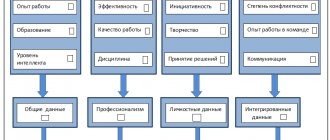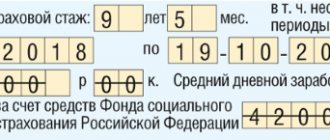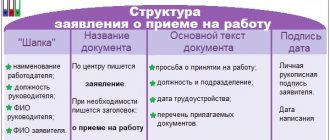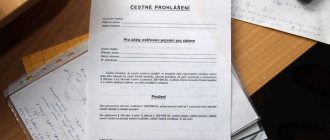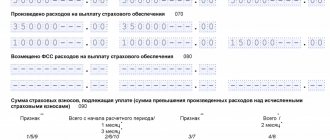What are they for?
Job seekers are often perplexed: why fill out an application form for a job interview if the employer has already received a resume for review. And sometimes they express the opinion that a written questionnaire for employment is useless, because it is easily replaced by an interview. But no, neither a resume nor an interview can be called a full-fledged replacement for a questionnaire. Since the candidate tries to present himself in the best light in his resume, he sometimes does not indicate unfavorable information (temporary jobs, presence of small children). After all, the main purpose of a resume is to receive an invitation to an interview. As for the interview, this is the second stage of direct acquaintance between the employer and the future employee, and the first is a well-written questionnaire.
What benefits does a company receive before interviewing a candidate using questionnaires:
- general information determining the legality and expediency of further interaction with the applicant for the vacant position;
- an adequate initial assessment of his professional qualities, necessary for making a decision on admission.
For the applicant, this document is no less important. A potential employee will be able to learn a lot about future employment, and it often contains questions that are not answered in the resume. You won’t be able to dodge an awkward question without answering it in the questionnaire: the employer will ask it anyway.
Typically, questionnaires for applicants contain a list of mandatory items that allow you to evaluate the candidate, his professional level and personal qualities more deeply. Looking through the information specified in the questionnaire, employers pay attention even to such little things:
- the applicant's literacy level;
- accuracy of filling;
- the amount of time spent filling out the questionnaire;
- completeness of the data provided;
- attentiveness, etc.
At the same time, HR assesses the emotionality and mood with which a person comes to an interview. Thus, the job application form reveals the social and psychological characteristics of the applicant, which simplifies the selection of candidates.
Sometimes the questionnaire is offered to be completed electronically, but the purpose of such a procedure is solely to collect information about the potential employee.
11 main interview questions with answers
How to answer the question - Tell us about yourself at the interview.
When answering this question and other questions from the interviewer, remain calm and speak in a confident tone. Tell us what will be important for the employer to hear: place of study and specialty, work experience, knowledge and skills, interest in this particular work and personal qualities - resistance to stress, learning ability, hard work. This point is discussed in more detail in this article, which provides an approximate story of the applicant about himself, as well as recommendations on how best to answer.
What to answer at an interview to the question - Why did you quit?
When answering the question why you left your previous job, do not talk about conflicts at your previous job and do not speak badly about your boss or colleagues. You may be suspected of conflict and inability to work in a team. It is better to remember the positive moments from past experience, and name the reason for leaving as the desire to fully realize your abilities, the desire to improve your professional level and pay.
3. How to answer the question - Why do you want to work for us?
Start with the positive aspects of the company's work - stability and a professional, well-coordinated team, interest in the field of activity, and then add what attracts you to the position and work schedule, proximity to home, decent wages.
4. Why do you think you are suitable for this position?
How to answer the question - why should we hire you? Here you must prove very clearly and convincingly that you are the best specialist in this field. Tell us about the work of the company and the industry in which you are going to work, do not hesitate to praise yourself, tell us about your achievements.
5. How should you answer a question about shortcomings at an interview?
The question of shortcomings is quite a tricky one. It’s not worth posting your disadvantages as best you can. Name such “disadvantages” that look more like advantages. For example: I’m picky about my work, I don’t know how to distance myself from work. And it’s best to say neutrally: I, like everyone else, have shortcomings, but they do not in any way affect my professional qualities.
6 secrets for a successful interview
What strengths do you have?
What advantages are not recommended to be used due to their cliché and standard nature:
- communication skills;
- learning ability;
- punctuality;
- diligence.
These are standard examples of advantages that are included in almost every resume; they are not particularly significant for the employer, and do not distinguish the applicant from others in any way.
It is better to talk at an interview about professional advantages that will be useful and interesting to the employer:
- I have experience in negotiations at various levels;
- easily conclude important agreements and contracts;
- I can organize my work day rationally, etc.
Such answers will attract attention and stand out among other answers.
What salary do you expect?
The services of a good specialist cannot be cheap. There is an option - name an amount higher than the average salary, or focus on the salary you received at your previous job and inflate it by 10 -15%. Stick to the golden mean, otherwise they may think that you are either a bad specialist or too ambitious.
Where do you see yourself in 5-10 years?
Persistent and purposeful people set long-term goals for themselves and plan their personal and career growth. If you haven't thought about this question yet, do so before your interview. Focus on your desire to work in the same company, but during this time climb the career ladder.
Who can give recommendations about your work?
Do not hide your previous place of work; be prepared to give the phone numbers of former colleagues and managers. If, when answering this question, you hesitate or completely avoid answering, then the employer may believe that you want to avoid negative feedback.
Are you ready for professional stress?
The employer can hint at overtime in this way. In this case, ask how often they are possible: how many times a month or for how many hours. If you are ready for such conditions, then confirm your readiness for stress.
Do you have any additional questions?
It's time to find out the details of your future work: starting from the schedule and social networks. package, to the requirements for company employees. A person who does not ask questions after an interview shows disinterest. So there must be questions, and it is best to think through them in advance.
It is recommended that the applicant prepare questions in advance in order to ask them at the interview, when the employer provides time for this - what to ask the employer?
For whom is it required?
By order of the Government of the Russian Federation No. 667-r dated May 26, 2005, the questionnaire must be filled out by citizens wishing to take part in competitions for filling places:
- state civil service;
- municipal service.
In all other cases, the questionnaire is not included in the number of documents required for employment (Article 65 of the Labor Code of the Russian Federation). Despite this, many businesses develop their own sample employment application form and use it to evaluate a candidate.
IMPORTANT!
All information about the applicant that is indicated in the document is confidential information and is not subject to public disclosure (Article 86 of the Labor Code of the Russian Federation). If confidentiality is violated, the employer will be held criminally liable. The one who processes the documents has access to personal data and is obliged to maintain confidentiality (Federal Law of the Russian Federation No. 152 “On Personal Data”, Article 6, paragraph 3). According to the law, the head of the enterprise is responsible to the state for the actions of the operator.
Video - awkward interview questions
The preliminary employment application form is filled out after the resume has been sent and reviewed. In fact, this document is the first stage of the interview, at which personnel services conduct a preliminary selection of applicants.
The main purpose of the survey is to determine the personal qualities and characteristics of the employee, his life guidelines and values; also, during the study of personal data, inconsistencies between the information submitted in the resume and the real work picture of the applicant are often revealed.
What questions does it contain?
The form includes from 10 to 30 points on which the employer wants to receive information from a potential employee. Among them:
- FULL NAME. applicant for a vacancy;
- Date and place of birth;
- citizenship;
- address of actual residence and place of permanent registration;
- telephone, email address;
- passport details;
- education (including additional and courses);
- attitude towards military duty;
- availability of a medical book;
- information about work activity for a certain period of time (place and period of work, position, responsibilities, salary);
- professional skills and abilities;
- marital status and information about close relatives;
- hobby;
- character strengths and weaknesses;
- wishes for working conditions and salary;
- having a driver's license;
- level of foreign languages and PC proficiency;
- presence of chronic diseases;
- recommendations from former employers.
If you want the employer profile to be as informative as possible, the questions should be formulated clearly and concisely. Then the answers to them will be the same.
Enterprises that require filling out a detailed questionnaire for employment (for example, banking structures) must take care in advance to document the voluntary nature of the provision of personal data, for which it is necessary to obtain the written consent of the candidate, according to Article 9, paragraph 4 of the Federal Law of the Russian Federation No. 152 “On Personal Data”. data."
Correct tricks for filling out job applications
When analyzing completed questionnaires, HR specialists tend to take into account all the little details, on the basis of which a psychological portrait of the applicant is compiled.
As an illustrative example of the discrepancy, we give the following point: the applicant writes neatly in the characteristics column, while the document is filled out with careless handwriting with letters and words extending beyond the indicated columns of the table.
So, when filling out such a document, it is important to follow a number of simple rules:
- Methodicality and accuracy are expressed in the fact that letters and words do not go beyond the graph;
- Attention is not only about missing letters in words, but also about correctly answering questions where you need to arrange numbers or objects in a certain sequence;
- Punctuality - it lies in the answers, where you need to disclose the dates and periods of work at previous enterprises and organizations; omissions cannot be allowed here;
- Moments of conflict and criticality of an employee are determined by the degree of pen pressure when writing “no” answers or ticks to specific questions, and therefore it is worth writing with even pressure;
- The ability to make decisions and clearly define tasks is revealed by studying answers to situation questions;
- Complex questions determine the level of intelligence;
- General culture and literacy are determined by the number of spelling, stylistic and punctuation errors.
Attention is paid to the inclination of the handwriting, haste, and even the chosen color of the pen paste and many other nuances that sometimes seem unimportant to the applicant.
Conclusion
You can put an end to employment with your own hand by indicating unnecessary information about yourself. Thus, one of the employer’s tricks is to include columns that allow him to reveal the details of the private life of a potential employee. At first glance, such questions seem completely harmless, but this is precisely what should be alarming. As a rule, this is a block of questions about a person’s interests and hobbies. It’s better to answer them neutrally, for example, I like to read, solve crossword puzzles, listen to music. The latter gives almost no information about the person to the HR employee.
How to correctly compose a questionnaire
We offer some practical tips for writing a job candidate profile. It is very convenient when questions are grouped by topic. This will make the work of both the interviewer and the interviewee easier.
Divide the questionnaire into two parts: general questions in one part, highly specialized ones in the second. This division makes it easier to use a single form of the questionnaire for a large enterprise, since its first part is the same for all vacancies in any workshop or department of the enterprise.
General issues
In the first part, the standard points usually come first:
- Date of Birth;
- residential address;
- Contact Information;
- Family status;
- children;
- attitude towards military duty;
- having a criminal record.
Education
Next, ask questions about education. Even if this information is not very important to you, we recommend asking the applicant about his theoretical background. Tell the person how to fill out a job application by asking him to name:
- educational institutions in which he studied (with years, assigned qualifications and diploma numbers, which are easy to check if necessary);
- advanced training courses completed, seminars, master classes and conferences attended;
- degree of proficiency in foreign languages.
If the last point is important directly for the position held, we recommend checking your actual language proficiency during the interview, since the candidate’s self-assessment of his language skills often does not correspond to the real state of affairs.
Employment goals
Then ask questions to understand the applicant's goals for future employment. Include questions in your job application survey that will reveal the applicant's motives and goals. Examples of such questions:
- what position would you like to hold now;
- do you want to make a career;
- Is there a desire and/or ability to work overtime and on weekends;
- How does a person feel about business trips?
A great way to understand an applicant's personality is through preference lists. Suggest, for example, ranking by importance a list of benefits that a candidate would like to have in this workplace:
- good team;
- decent salary;
- growth prospects;
- advanced training or obtaining qualifications;
- proximity to home;
- flexible schedule.
By ranking such a list, a potential employee will reveal preferences and thereby reveal himself. It makes sense to offer to add your own option to the ranked list.
Health status
Whether it is worthwhile to include questions about the health of a potential employee in an applicant's application form when applying for a job, each employer decides independently. This is a rather slippery issue, since such questions are sometimes equated to an invasion of privacy. At the same time, quite important information that will affect the employer’s obligations towards the employee (providing benefits, etc.) is disability and chronic diseases that require regular hospital treatment.
We suggest using the following tactful language:
“Do you need special working conditions due to your health condition?”
or
“Do you need extra days off to care for a relative?”
IMPORTANT!
A refusal to provide a workplace to a person with health limitations (if these restrictions do not affect his ability to perform the assigned work) may become a reason for going to court.
Personal qualities
One of the painful points of the first part of the questionnaire is personal qualities. These questions not only cause a negative reaction from the person being questioned, but are also extremely ineffective, since a person is rarely able to adequately assess his own strengths and weaknesses, especially when applying for a job. Using list ranking is ineffective; it is more practical to use the oral interview method.
Experience and skills
Having finished with the first, general one, we move on to the second, highly specialized part of the questionnaire to fill out, which we recommend starting with obtaining information about work experience. The structure of this section should serve two purposes:
- Provide the employer with the necessary information about the candidate’s work skills. To do this, indicate the profession, who he worked for, positions held, and a list of duties performed.
- Get an idea of the candidate's communication skills and mental stability. To do this, they ask about the reasons for changing jobs and ask the person to name one or two former colleagues who can give characteristics and recommendations.
To obtain relevant information about work skills, a highly specialized questionnaire is required. When filling a driver vacancy, they are interested in the category and time of obtaining a license, and driving experience. If a programmer is surveyed, they ask questions about proficiency in certain programming languages, specific software products created by the applicant.
We recommend that this section be written by the immediate supervisor of the future employee, who knows how to correctly fill out a job application form for a good specialist. This is a very important point in the questionnaire. No matter how communicative and stable a candidate may seem, if he does not have the necessary work skills, he is unlikely to cope with the proposed functionality.
Pass the "exam"
You should prepare for an interview with a future employer almost like you would prepare for an exam. Absolutely everything is important – from appearance to filling out the application form. After all, passing this particular stage will allow you to determine whether you should work in this field or not. There are often cases when, on the night before a meeting with his future employer, a person repeats all sorts of materials related to his future profession, practices answers to expected questions in front of the mirror, spends a long time choosing what and how to wear, shoes, etc. All this, of course, is very important, and all these efforts will not be in vain if you really approach this matter with all responsibility.
An interview is also similar to an exam in that there is a dialogue, during which the main positions occupied by each interlocutor are revealed. During an interview, what matters is not how many questions you answer correctly, but how you know how to behave, speak, and defend your opinion. And when you answer questions on a job application form, it is important to formulate your thoughts clearly and clearly. The main principle is to always answer honestly, you should not reveal all your existing shortcomings, but attributing excessive advantages also does not make sense, and sometimes it is even stupid.
So, the main principles when answering questionnaire questions or in direct dialogue with an employer:
- honesty>
- decency>
- competent speech without filler words and stuttering>
- If you fill out a form, try to do it at least without grammatical errors>
- sincerity>
- Of course, every phrase is well thought out, in such a case every little thing matters.
Tricky questions that may come up during an interview or application form
Unfortunately, not everyone is able to give decent answers to a job application the first time.
And this absolutely does not depend on whether you are a literate person or not. It’s just that sometimes the applicant is not quite ready for some questions. There are also those that simply lead a person into a dead end, but this happens quite rarely. Most often, such questionnaires are compiled on the most common and well-established questions, such as the following:
- Describe your strengths and weaknesses. This is where people most often tend to fantasize and evade. It is a rare candidate who will be able to honestly evaluate himself. But in order to achieve success, in any business you need to be honest and slightly self-critical. This will help you improve morally and professionally in the future.
- Describe where you see yourself in 5-10 years. This question is not aimed at you describing your future career ups, but at identifying how well you know how to assess and distribute your strengths, what ambitions you have, whether you know how to plan and distribute free time, and your attitude towards life. Based on your answer, the employer will be able to easily understand how you feel about the profession, whether you want to achieve success in a particular area, whether you want to contribute to the development of the company, or just want to earn a living.
- An employee's application form when applying for a job contains the most common and one of the most important questions - a question about your personal life. Many people, when answering this question, are somewhat embarrassed because they do not know what, according to their superiors, is good and what is bad. For example, girls do not know for sure whether their employer will like the fact that they are already married and have children, or whether this will contribute to a refusal to hire them. Don't worry about it. This question is aimed at allowing the employer to get to know you better - nothing more. He is absolutely not interested in the mysteries of your personal life. Therefore, answer as you see fit.
The most popular survey questions
- A question for which you should be well prepared – tell us about yourself. And here you have a great chance to tell or write about how long you have been dreaming of getting into this particular organization and this position, how hardworking, responsible, punctual you are, what a high level of self-organization you have, how you like to carry out orders and do not tolerate negligence at work. The main thing is that this is really so, because if you are deceiving, it will immediately come out and the result will be a rather unpleasant situation.
- The employer may ask you a question about what interests you, perhaps you have certain questions, or simply want to clarify unclear points in the work or in the future contract, etc. In fact, if you are serious about getting this position, then before the interview you should definitely have many or at least a couple of questions regarding your future work. For example, they may relate to salaries, work schedules or internal regulations of the company, and others. An important point: do not ask the employer more than three diverse questions, unless a certain set of circumstances prompted you to do so.
- Why did you choose our organization/enterprise? Write that your dream has always been to join a team of strong, qualified specialists, that you want to gain experience in a certain area, or that you want to apply previously acquired knowledge and share your experience, and you think that this particular company will benefit from it. Don’t forget to mention that this is where you see prospects for your development.
- Have you already had job offers from other companies? If they really were, then do not hesitate to say about it and add that this proposal is much more important and interesting for you. Perhaps this answer will increase your chances of getting this position.
- The next question is the most unpleasant - for what reason did you leave your previous job? Under no circumstances talk about unpleasant situations or conflicts, even if they were present at your previous job. Don’t put your bosses in a bad light, don’t tell them how you were offended, etc. It is best if you smoothly skip the answer to this question and remember only positive moments, for example, life and professional experience gained, certain skills and business connections.
A correctly filled out application form when applying for a job is a ticket to a completely new and interesting life. This is a guarantee that you will get a decent and highly paid position, and that you will enjoy going to work. This is a “green light” on the path to success and career growth, so such an important event should be taken responsibly.
So, you have been invited for an interview. Do you really want to work in this position and are very afraid of not passing the selection? Then you need to gather all your willpower and prepare for the conversation: think about your clothing style and rehearse your speech, taking into account likely questions.
11 basic interview questions and smart answers to them can be found here. How to answer complex and non-standard questions to please the employer? What questions the recruiter will ask depends on what position the employee is being hired for, however, as a rule, there is a standard set of questions that are asked to all applicants, which will be discussed below.
Before conducting an interview, the employer usually asks the applicant to fill out a special questionnaire, a sample of which can be viewed here.
Lately, situational questions have been very popular, when the employer describes the situation and asks the applicant to choose the correct behavior in this situation.
What not to ask
The law does not allow the employer to include whatever he wants in the questionnaire. Topics related to religion, nationality, race, origin, financial status are not contained in any example of filling out a job application form, since these points are purely personal. If a candidate decides that he was rejected because of a different race, nationality or religion, considers this refusal as a violation of the equality of rights and freedoms of a citizen, remembers Article 136 of the Criminal Code of the Russian Federation or Article 64 of the Labor Code of the Russian Federation, then he will go to court. Winning such a case for an organization is neither easy nor cheap, so we recommend avoiding such topics during surveys and interviews.
IX. Self-Esteem Information
Some companies include psychological tests in their questionnaires. Without going into the details of such testing, let us note that a couple of questions about character will provide additional information for consideration. But you shouldn’t overuse this - there aren’t too many “easy-to-use” test methods, and often, after attending several interviews, applicants are already excellent at fending off stereotyped “psychological blows.”
Answers to the following questions can give a general idea of a person’s self-esteem:
- When you are asked “What kind of person are you?”, what are the first words that come to mind (write 3 - 4 definitions of what kind of person you are)?
- List 5 of your positive qualities.
- Indicate which 3 negative qualities you have.
- What qualities of your character would you like to get rid of?
For the results of psychological testing, you can provide a place right in this section, or at the end of the questionnaire.
Optimal questionnaire size
The document should be sufficient, but not excessive. And in order not to scare off potential employees, we recommend asking tactfully and minimizing the number of personal questions. It makes sense to ask only what is directly related to the future position and assumes the possibility of a reliable answer.
Let us remind you that the law obliges a candidate for a vacant position to provide honest personal information. If forged documents are used, the employer has the right to terminate the employment contract (Article 81 of the Labor Code of the Russian Federation).
V. Information about professional skills
Questions about professional skills are another very revealing group. How broadly a person describes his professional skills will tell you how scattered he is in his aspirations.
But you can look at the answers another way. Multifaceted professional experience is often found among people who worked in small companies, where the range of responsibilities was quite vague. A former employee of a large structure with a rigid hierarchy, on the contrary, will have excellent knowledge and skills of a narrow focus.
Analyzing the answers to the questions in this section should also provide you with information that allows you to separate theorists who are happy to describe their abstract knowledge from practitioners. To do this, we ask about:
- Degree of computer proficiency (for example: “Indicate the type of program (operating systems, text editors, spreadsheets, databases, specialized programs), its name and the degree of your proficiency with it (“experienced user”, “basic functions”, “familiar with the principles of operation” ", "studying").
- Skills in working with office equipment (for example: “Indicate the degree of your knowledge of office equipment (“experienced user”, “basic functions”, “familiar with the principles of operation”) for the following types: computer, fax, copier, scanner, fax modem, etc.) .
- Availability of a driver's license, category, driving experience.
- Having a personal car.
In addition, answers to the following questions will tell you about the applicant’s professional skills:
- What are you most proud of in life?
- What are the greatest professional successes you have achieved in life?
- What skills, abilities and knowledge do you think will be most useful to our company?
- Describe what you can do better than others.
- Describe your management experience.
- What exactly were your organizational skills?
- Diagram of mutual subordination (draw a functional diagram for the last two places of work).
- Indicate your greatest strengths as a professional.
- List three situations in which you lacked professional skills.
A place for the results of professional testing can be allocated directly in this section, or at the end of the form.
Sample filling
The applicant fills out all items in legible handwriting, trying to avoid corrections. If a person finds it difficult to answer a question or does not want to do so, it is prohibited to demand an answer. An example of how to fill out the questionnaire:
What happens to the questionnaire after filling it out? Information about all candidates is entered into the enterprise database (if the person has consent to the processing of personal data). When a new vacancy appears, a candidate who was not selected earlier may be remembered and invited back for an interview. It is quite possible that the second attempt will be successful. If employment has taken place, the questionnaire is filed along with other documents in the employee’s personal file.
Types of questionnaires and their features
Questionnaires are developed by personnel services of enterprises and organizations; in some cases they have established forms and types when it comes to state federal and military service. This is a separate type of questionnaires that are closed or even secret, and are called admission questionnaires or admission cards.
But let’s look at the most commonly used types of questionnaires:
- Semi-closed questionnaires - their structure is structured in such a way that the applicant is asked to enter information independently, as well as choose an answer option from those suggested in the text;
- Handout questionnaires - their key purpose is to determine the level of professional competence of the applicant, they are relevant when recruiting personnel on a competitive basis, and the text is in the form of a test with and without answer options;
- Individual questionnaires - this type of questionnaire is used to identify the personal qualities of an employee; as a rule, employer psychologists work with such questionnaires, determining the degree of stress resistance of a person and his level of responsibility.
Questionnaires for applicants can be posted on employment websites, on official Internet resources of the company, where an interested specialist can fill it out and send it to the employer.
Employee questionnaire
Types of interviews (briefly)
The interview can be individual or group, single-stage or multi-stage, and the interview also differs in content. Some companies are only interested in the candidate’s biography, others offer to analyze a specific situation and solve the problem.
A special type of interview is stressful. They ask the candidate provocative questions, try to unbalance him, force him to leave his comfort zone.
This type is most often used when hiring people for leadership positions. In other cases, a standard conversation is enough. However, this does not change the fact that the interview can be multi-layered.
